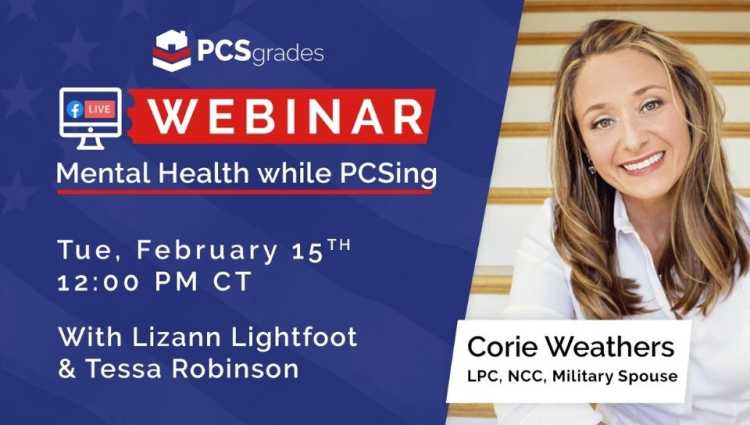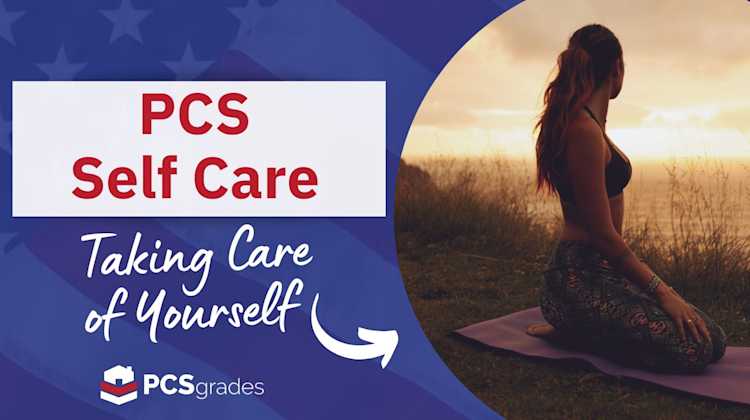Webinar: Mental Health While PCSing
by Lizann Lightfoot - February 26th, 2022

Our Guest: Corie Weathers
I’m a licensed professional counselor, and I’ve been providing counseling to military and first responder families for about 15 years now. I’m a military spouse myself, so my heart is for military marriages. We are currently stationed at Fort Hood, after moving on average every 1.5 years!
Watch the full interview here:
How do you define mental health, and how does it relate to PCSing?
I like to think in terms of buckets or baskets. Usually we think of mental health in regards to our minds. Where is my mind, do I feel healthy, do I feel in a good place? We are human beings, and every day is different, so you can be “off” on any given da
y, so our mental health can vary by the day. So in one basket is situational mental health that changes from day to day and requires us to cope. But there’s another basket that has more to do with the physical elements of mental health--your hormones being off, your brain chemicals being unbalanced, etc. So no matter how many coping strategies you have, you’re still going to feel off, and medication may be a good option here--even if it is just temporarily. There can sometimes be stigma attached to this.
How long should it take to adjust after a military PCS, and how can I tell if I or a family member needs help after a PCS?
Moving is a huge life shift that causes stress--it’s a life change similar to having a child, the grief of losing a parent, going through something traumatic. Just because we got through it often doesn’t mean we should get used to it or that it shouldn’t stress us out. It is definitely stressful, and we will have a physical and emotional impact for the entire family: service member, spouse, and kids.
As military families, we are constantly absorbing many major life stressors, especially if you are having a child, going through COVID, dealing with deployment, or doing some other life shift on top of a move. So expect to give yourself a buffer both before and after the major life shift. Take time to assess if you are more short and irritable than usual. Your energy is coming towards your family, so ask yourself, “am I being the person I want to be?” Am I speaking to people the way I want to? Look at the relationships around you as a mirror to assess how you are doing.
Red flags include irritability, lapsing on major personal goals (eating healthy, major hobbies that bring us joy, disrupted routines), weight gain, etc. It’s common for sleep to get disrupted. But if we find ourselves bickering, it’s time to take a pause and discuss ways to get back in sync. If you are carrying conflict from day to day, we need to pause and set ourselves on a new trajectory.
What are your favorite evidence-based methods for improving mental health during a PCS?
I want to first acknowledge that we all know tested, proven things that work for us. You probably know what things in your life work to reduce your own stress. Whether you're introverted or extroverted, community is very important. So an extrovert might need to get settled so they can go out and find their new people. An introvert might think they need to find their routine or pick up their hobby again, or go for a run. EMDR is evidence-based, and this is the action of your eyes going back and forth and moving, so going for a walk or run stimulates your brain and helps you work out that stress.
Nature is another thing we know from research, that we need to have about 20 minutes of interaction with nature each day. Sometimes when we move, we feel like we need to do everything in the first week and get it all done--but we haven’t even gone outside! When we moved to Leavenworth, I had plants in the ground before the moving truck showed up, because I needed something in the ground that I could enjoy, that would get me outside and give me a chance to pause and breathe fresh air.
Read more about Corie's mental health while PCSing tips here.
Our relationships experience stress during a military PCS, so how can we help our family members deal with the stress of a move?
We need to extend grace to each other and to our spouse, and remember that our kids don’t have the capacity to express stress. They are all in a different mental stage, a different stage of processing, and we all adjust in different ways. Sometimes we need to lean on the strengths of the others in our home to remind us that everything is going to be okay. If your kids are good at seeing silver linings, ask them to breathe life into your perspectives.
There can often be mis-communication that leads to conflict during a move. To me, that’s a question of connection. I want to feel connected to others so I won’t feel like we re all harboring resentment. I created a tool called the 5-Minute Check-In that is very effective for service families, to help you quickly get in sync and communicate what you need. It is easy to get in a loop of our thoughts and worries, and just replay that. Whenever we are on a loop, it turns into anxiety, because it never turns into a product or gets out of our head. The goal is to get through these 4 quick questions that we can answer in 2 sentences. It discusses physical feelings, thoughts, emotions, and finally what do I need? If we can get through this and vocalize how we feel and what we need, this is a fantastic tool to improve communication with your spouse, your kids, and your teens. This helps us lower anxiety and meet each other’s needs so we can empower each other.
How can we support kids during a PCS move?
There is a lot of research coming out that our military kids are expressing mental health challenges. Especially with COVID, people--especially teens--are struggling more than usual. If you have kids, communicate with them, regardless of their age, to let them talk and share their feelings. The FeelingWheel.com lets people see a wider variety of feelings so they can express themselves better.
I prefer the term “grit” to saying “resilience.” I don’t want to bounce back, I want to bounce forward. Angela Duckworth has a book called Grit and she defines grit as not talent based. Gritty people are not especially talented, and they weren't born with something unique. Really, gritty people have the ability to see a long-term goal and are willing to endure the obstacles to reach that goal. And our military kids are gritty! So focus on long-term goals, not the obstacles in front of us. That’s how we endure and develop grit. Help your kids envision long-term goals if they are struggling right now. They can’t vision-cast for themselves, but you can help them with that.
Here are additional tools to help kids with a PCS move.
When do you need to seek assistance for mental health?
After my first child, I struggled with post-partum. Here were my warning signs: I had tried the self-care and coping skills, going for walks, balancing nutrition, doing all the right things, but it wasn’t quite doing the job. There have been many moments in my life when I was struggling and I was so depleted and I just couldn’t pull myself out of it with my own coping strategies. It’s important to communicate honestly, so go to your marriage. Don’t try to be a super-hero and hide your vulnerability. Don’t save yourself for last because it catches up to you. When I went to the midwife after my first baby, my situation turned out to be chemical imbalance. It wasn’t going to shift on its own. She gave me a low dose of medication to “raise the ceiling of happiness for me” and it felt like a cloud lifted, I had a little more breathing space, and just a little more room to adjust. So don’t be afraid to take that step if you need to.
Where can you get help for mental health as a military spouse?
Chaplains have 100% confidentiality, more than any other clinician. They do not have to report anything, but if it is an unsafe situation, they will encourage you to take healthy steps. An MFLC (Military Family Life Counselor/ Consultant) is embedded with the military unit or a military school, and they can meet with kids at school to just chat with them, or they can also be helpful with your marriage. So chat with the unit or the base resources to connect with an MFLC.
Military OneSource is a great way to connect with a clinician for non-medical counseling. They can do 12 sessions for free, on a specific topic, to just give you a quick reset and some tools. Some of them are also your Tricare counselors, but you can’t go back and forth between Tricare and Military OneSource.
I also created the Lifegiver Directory, which lists military spouses, veterans, and military-friendly civilians who are all clinicians that you can reach out to and connect with. Don’t be afraid to reach out to other counselors in your current state, because so many people are now doing telehealth and are able to do virtual counseling appointments with you.
If someone doesn’t feel like a good fit, I encourage you to give them a few chances--kind of like dating--but give the clinician a chance to adjust and role model a healthy relationship for you. I would like the opportunity to try to adjust if you ask! About every other assignment, I go and get counseling myself, and I have needed something different in each season of my life. Sometimes I just need someone to LISTEN to me.
How do you pursue continuity of care for mental health when you move?
Counselors are licensed in a particular state to protect YOU. They have agreed to abide by the laws of that state. If I move out of state, my old state can’t protect me anymore, so I need to find a counselor who is licensed in my new state. If you move around within the same state, consider telehealth, because then you can stay with the same counselor in the same state.
Coaching is a separate certification--it is not counseling--it is more like a consultant, and there are a lot of therapists who provide coaching in multiple states. Tricare covers counseling and won’t provide for coaching, because coaching doesn’t include medication and counseling needs to be licensed in a particular state. Psychiatrists can provide medication. If you need a psychiatric evaluation, you need to go to someone who understands the medication. Tricare will ask you to get a referral for that from your PCM. But usually you do not need a referral for non-medical counseling because it is coaching or counseling.
Military OneSource is like an additional service to Tricare. Tricare covers medical needs. Behavioral health and counseling is considered medical if it includes a “diagnosis.” Most clinicians will list “adjustment disorder” as the lightest diagnosis possible, and that’s so Tricare will cover it and help you adjust. Military OneSouce doesn’t require a diagnosis. You can go for a few months, talk to a Military OneSource clinician who will take minimal notes and help you with more general life issues and struggles in 12 sessions or less. It’s great if you just need to talk to someone and get some tools to help you on your way.
There is sometimes a stigma in seeking medical counseling. What would you say about that?
We are all human beings and will have moments of struggle. A military PCS can make those struggles even more pronounced. It is always going to be a roller coaster ride, even when you get out of the military. We are not super heroes! Getting help is not going to put you on EFMP (Exceptional Family Member Program) status. There are only a few people with a medicated mental health issue that might decide to become EFMP that might decide to do that to get continuity of care. But that is their choice, and is not an automatic part of mental health care.
I get a lot of questions about whether or not to send children to counseling. Your medical files are yours, they are HIPPA protected. The only way it can be exposed is by subpoena, so we treat your mental health file as protected information. If your child wants to be in the military, they are volunteering to join, so they will expose their medical file to join. But you seeking mental health care is not a reason to screen or bar your child from anything.
Can I lose a security clearance over going to counseling? There are a lot of leaders out there encouraging people to get the help they need. You can also seek help within the unit, and get help from others with a security clearance. But typically, the things you need to talk about in counseling are things that can be described very broadly in general terms without going into details, so a service member can seek counseling without violating a security clearance.







